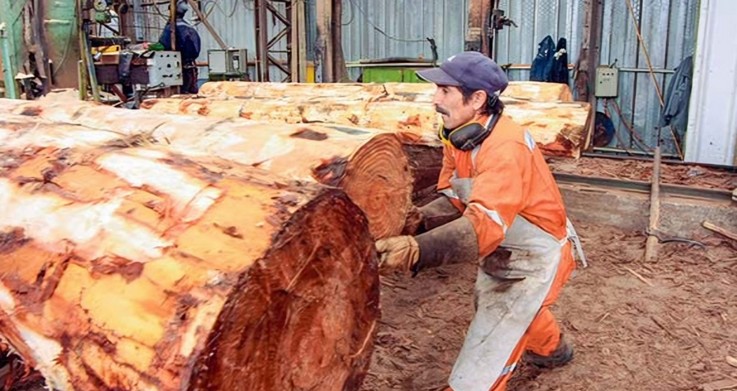- Industry organizations estimate that around 30 contractor companies have gone bankrupt or halted operations due to the shortage of forest plantations, wildfires, and security issues.
The crisis in the forestry industry continues to worsen. Following the closure of the El Colorado sawmill in Curanilahue (Arauco), which left 78 people unemployed, industry associations warned that in the coming years, around 100 forestry complexes will cease operations due to the lack of timber. This adds to the 308 facilities already paralyzed, closed, or suspended across the country.
This situation stems from the shortage of forest plantations after the expiration of the 2012 Promotion Law, further aggravated by wildfires, regional violence, and timber theft. "There is no available timber for the next 20 years for approximately 100 small and medium-sized sawmills, so these will close in the coming years," warned Hernán Muñoz, who represents around 120 of these firms. The businessman and leader did not hesitate to describe the industry's current state as the worst crisis in its history.
"The situation can only be corrected in 20 more years—if we start planting now," Muñoz stated. "The coming years will only worsen the scenario due to wildfires, moral violence, and illegal land occupations," the leader cautioned.
According to the Association of Forestry Contractors, about 30 companies in the sector have gone bankrupt or ceased operations due to the lack of forest resources, insecurity, thefts, and other factors, said René Muñoz Klock, a leader of the association.
The industry's situation was denounced by Corma president Juan José Ugarte, who warned that Chile, once a forestry powerhouse, has reduced its planted forest area to its lowest level since the GDP recorded in the 2012-2013 period.
According to this industry leader, around 35,000 hectares of plantations are lost annually, resulting in 3,200 job losses—all valued at $1.2 billion. The peak in forest volume was reached between 2012 and 2013 (with 2.4 million hectares), and since then, the decline has accelerated, stated Corma's president.
LARGE COMPANIES
This crisis affects not only small and medium-sized forestry businesses but also large corporations. In Arauco's case, besides the 2024 closure of the Curanilahue sawmill, in 2023 it shut down its Horcones II sawmills in the Biobío region, a move accompanied by the dismissal of 123 workers. Additionally, operations at Licancel in the Maule region were suspended in September—a tough decision for the company due to difficulties arising from last year's winter climate events, leading to the layoff of 160 employees.
Although the Angelini Group's subsidiary owns over one million hectares of forest assets in Chile—285,000 of which are native preservation, protection, or conservation forests—the company was severely impacted by the 2017 wildfires that devastated the Santa Olga area near its Viñales forestry complex. This disaster deprived them of the necessary forest resources for industrial operations.
Both Arauco and CMPC have chosen to expand outside Chile. The former primarily focuses on Uruguay, Argentina, and Brazil, while the latter, linked to the Matte Group, recently announced a historic $44.57 billion investment in Rio Grande do Sul, Brazil.
LINES OF ACTION
For Hernán Muñoz of Pymemad, the cornerstone of all proposals is enacting a forestry promotion law, which would not only ensure timber supply but also prevent soil erosion in coastal drylands. Other action lines include decentralizing forest ownership, advancing sustainable forest management, promoting industrialization for higher-value products, and increasing investment in R&D. A key issue is modernizing forest governance.
At a forestry seminar with other industry stakeholders, Muñoz noted that every four years, they must educate the Minister of Agriculture about the sector's role and contributions while combating entrenched biases among authorities. The Pymemad leader did not hesitate to label some officials as hostile toward forestry. Thus, he proposed creating a more empowered Undersecretariat of Forestry to tackle the industry's major challenges.
Source:Diario Financiero







Comentarios (0)
No hay comentarios aún. ¡Sé el primero en comentar!
Deja un comentario